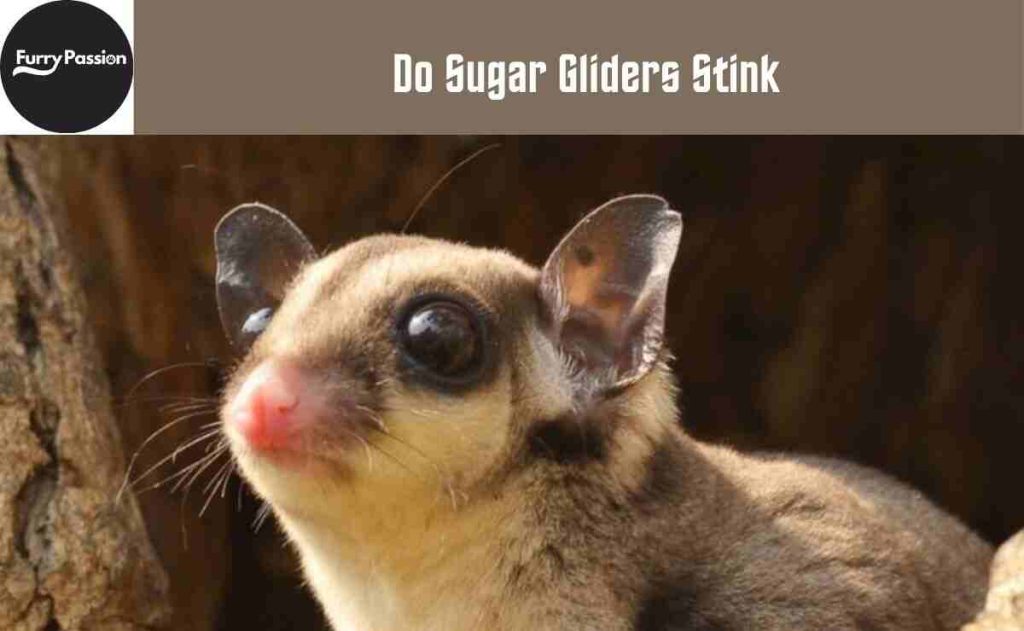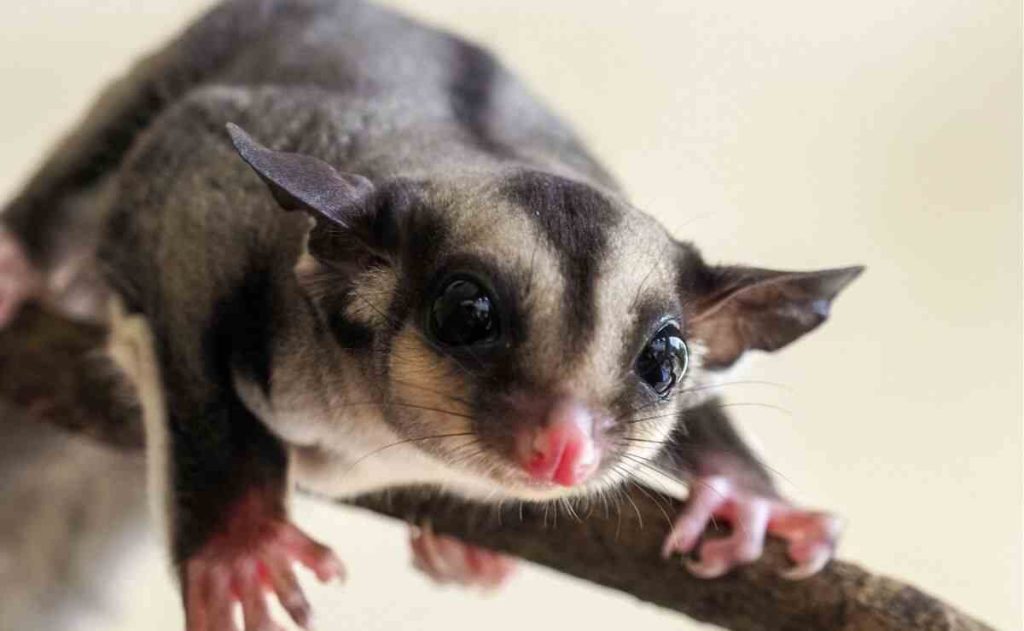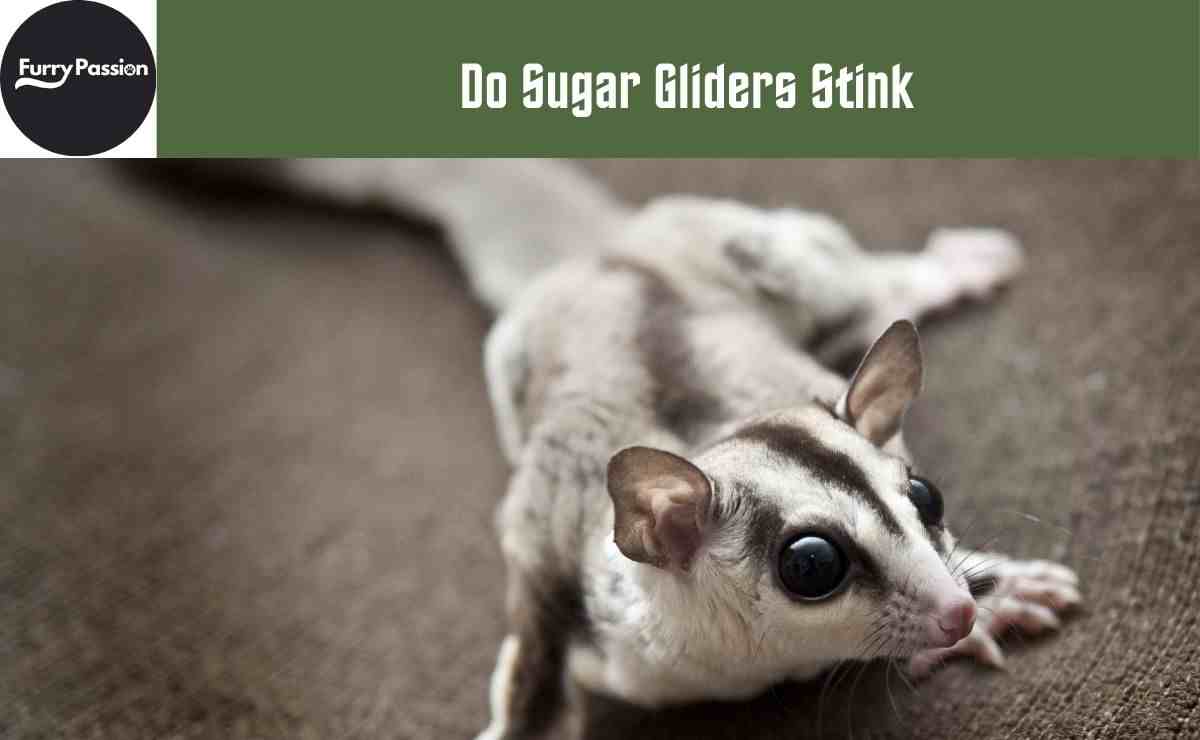Every mammal has their own scent glands. Your sugar glider has the glands too. So many of you are concerned about the fact do sugar gliders stink?
Actually, they don’t in true sense. Sugar gliders have an earthy musky smell but it isn’t that strong. Many sugar glider owners don’t find it unpleasant. Sugar gliders won’t have bad odors if the cage is clean and they get a proper diet. However, some gliders may have a strong odor which can be prevented. Know all the details in this post.
Do Sugar Gliders Stink?

Sugar gliders have a unique scent that comes from special glands of their body. These glands produce a musky smell that is often described as similar to a combination of sweet musk and a vague hint of ammonia.
Many people like the scent of sugar gliders even though it may be unpleasant for some. This distinct smell is not too bad. But new pet owners may find it stinky as they experience it for the first time.
Both male and female sugar gliders have the same scent glands. But male gliders have a stronger odor than females. The male has three scent glands on their body: chest, head, and genital areas. And the female has two at the pouch and genital area.
Sugar gliders use this scent to mark their territory and communicate with each other. They also have a unique foul smell that is used as a defense mechanism. When they are scared, a white fluid comes from their private parts that has a strong odor. However, it disappears when social bonding starts.
Reasons For A Stinky Sugar Glider
It is normal and natural for sugar gliders to have scent glands. Yet, they don’t have a strong odor. A sugar glider may have a strong odor or foul smell for a variety of reasons. While sugar gliders are typically clean animals, there are a few reasons why they may emit a strong or unpleasant scent.
- Poor Diet
Feeding your sugar gliders a blanched diet is important because they’re quite sensitive to what they eat. They should get enough protein, but giving them too much protein, like meats, bugs, or eggs, can actually make them smell foul, like ferrets.
Also, some fruits can cause trouble for your gliders. Take bananas, for example. They’re pretty acidic, and feeding them to your sugar gliders can sometimes lead to tummy problems like diarrhea and it can add a bad odor.
- Inadequate Hygiene
Just like other animals, sugar gliders’ pee and poop can emit bad odors. Especially, baby sugar gliders’ feces have worse odors as their digestive system is not fully developed.
If you don’t teach them where to do their business, they might end up making a mess right in their cage. Cleaning up after them can be quite a task, especially when that odor starts to linger.
That’s why it’s important to get them on a potty training routine. Once they know where to go, it’ll be much easier to keep their living space clean and odor-free. So, if you’re noticing a funky smell coming from your sugar gliders’ cage, it might be time to start working on that potty training.
Sugar gliders are small animals that are very skilled at grooming themselves, but they may need help from their owners to stay clean. Regularly cleaning their cage, and providing a clean environment can help prevent any unpleasant smells.
- Scent Marking
As we told earlier, male sugar gliders have a strong odor to mark territory. During certain times, like the breeding season, they can get a bit musky – it’s just nature doing its thing.
Sometimes, they might be going a bit overboard with the scent marking. So, to make sure everyone knows this is their turf, they might feel the need to mark it even more often.
But don’t worry, there are things you can do to help keep the odor under control. Regularly clean their cage but try not to scrub away all of their scent every time. Leave a little bit behind so they still feel at home, but not too much that it becomes overwhelming.
How Do I Stop My Sugar Glider From Smelling?

Sugar gliders owners are often confused how to deal with their unique musky odor. Thankfully, there are several steps you can take to help minimize or eliminate the smell coming from your sugar glider:
1. Regularly clean the cage
One of the most important steps in keeping your sugar glider smelling fresh is to clean their cage often. Keeping your sugar glider’s cage smelling fresh can be a bit of a challenging act. You see, these little critters are pretty territorial, and if they can’t smell themselves in their environment, they’ll go into overdrive to mark their territory.
Instead of doing one big clean-up session, try splitting it up into smaller tasks. One day, you can give the cage a wipe-down, another day you can focus on cleaning their bedding, and another day can be all about scrubbing their toys.
This way, you’re still keeping their environment clean, but you’re not completely erasing their scent every time. It’s also important to thoroughly clean the cage once a week with a pet-safe cage cleaner to eliminate any lingering odors.
2. Bathe your sugar glider
While sugar gliders are known to groom themselves regularly, giving them occasional baths can help reduce their natural musky scent.
Use a damp cloth or unscented baby wipes to gently clean their fur, being careful to avoid getting water in their ears. Make sure to thoroughly dry them afterward to prevent any skin issues.
3. Providing a balanced diet
The diet of your sugar glider can also impact their body odor. Make sure to feed them a nutritionally balanced diet that includes a mix of fruits, vegetables, protein sources, and a specially formulated sugar glider food.
While fresh fruits and vegetables are definitely a part of their diet, you don’t want to overdo it. Too much fruit, in particular, can cause digestion problems for your gliders.
It’s all about finding the right balance and making sure they’re getting everything they need without overloading them on any one thing. Avoid feeding them foods high in sugar or fat, as this can contribute to a stronger smell.
4. Maintain good hygiene
In addition to cleaning their cage and giving them baths, it’s important to keep your sugar glider’s environment clean and free of any potential sources of odor.
This includes washing their bedding regularly, keeping their food and water dishes clean, and ensuring their play area is free of waste.
5. Litter Training
Sugar glider litter training can make life much easier for both of you. So, the first step in litter training is to get a litter box and place it in a fixed spot in your sugar glider’s cage. This gives them a designated spot to do their business, which helps them understand where they should go.
Encouraging your sugar glider to use the litter box. You’ll want to gently guide them towards the litter box whenever you notice they need to go.
You can use a baby wipe to gently stimulate their bowel movements and urination. Just give their bottom and genitals a little rub with the wipe, and they should do their business in the litter box. Keep up with this process as many times as needed until your sugar gliders do it on their own.
6. Use odor-neutralizing products
In addition to regular cleaning and grooming, you can also use odor-neutralizing products specifically designed for small pets to help reduce the smell coming from your sugar glider. Look for products that are safe for use around pets and you can help minimize their natural musky scent and keep them smelling fresh and clean.
Conclusion
Sugar gliders are generally clean animals, there are a few reasons why they may have a noticeable odor. You can take necessary steps to prevent the bad odor.
Still, sugar gliders will have a mild musky odor and you can’t remove it. If you are considering getting a sugar glider as a pet, you should accept their natural scent
